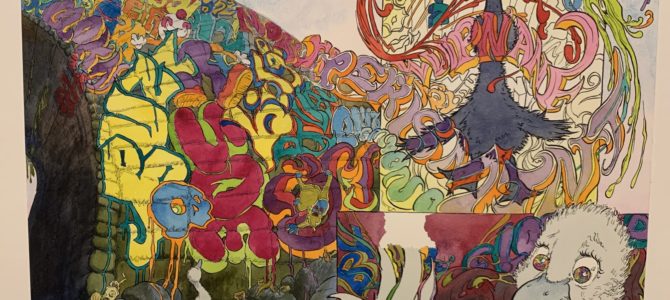
Hillsdale College professor Matthew Mehan has dedicated his life to educating young adults in virtue, liberty, and freedom. His latest venture? Properly educating future citizens — through picture books.
Mehan’s second and latest children’s book, “The Handsome Little Cygnet,” hit bookshelves in July. The story follows a young swan through the rivers of Central Park, guided and informed by Father and Mother Swan. The cygnet faces challenges and embraces curiosity — sometimes to his downfall. But through the course of the story, the little cygnet grows into what and who he really is.

In a culture that teaches children they can choose their identities, Mehan’s latest couldn’t be more timely. Modern education is riddled with “woke” thought, encouraging children to explore possibilities outside of their natures instead of teaching them humanity’s innate value.
Children are instructed to reject their race, abuse language, and pursue autonomy before they’re able to make prudent decisions. But according to Mehan, there’s a natural way of growing up and coming into oneself — a way that’s not currently promoted in most education venues. That’s why he wrote his latest book.
Especially in light of current educational practices, children’s books are important — they shape the imaginations of children. At his debut book event, Mehan displayed his newest work, explained its significance, and analyzed the mistakes in “woke” education.
What’s Missing From Woke Education?
Mehan isn’t on a crusade against “woke education.” He says “there are always nuggets of good when people try to educate their kids.”
Instead, Mehan focused on what is missing from woke education. Modern, faddish pedagogy hasn’t been practically thought through, he said. Language can be manipulated to shape the eye of the beholder — and to children whose eyes are most apt to be shaped, this sort of sophistry is dangerous.
Mehan’s previous book, “Mr. Mehan’s Mildly Amusing Mythical Mammals,” takes up the question of sophistry, or the use of fallacious arguments to intentionally deceive. One of the poems in the book is a rewrite of the popular “Jabberwocky” poem by Lewis Carroll — a nonsense poem laden with made-up words.
“It’s hilarious and delightful, but it’s breaking off from the norm to create something whimsy,” Mehan said of “Jabberwocky.” “But what do you do when everything breaks off from the norm, when everything becomes whimsy — when everything changes its nature?”
Most clearly, modern education is missing truth, Mehan said. Misinformation campaigns permeate education today. From critical race theory to gender dysphoria, children are constantly encouraged to attack their own nature. Yet this rejection of humanity only results in a loss of truth and love for one another: If you don’t understand your own nature, how can you properly love your neighbor’s nature?
Language — the ability to reason — sets men apart from animals. What you say, Mehan noted, has to be said out of love for another person. Anything that doesn’t adhere to truth or charity is jargon talk (much like the contents of the “Jabberwocky”).
If children aren’t taught the natural order of things or how to use language correctly, it becomes much harder for them to identify truth — and life without truth isn’t much life at all.
What Does It Mean to Accept a ‘Natural Order’?
Mehan set his latest book in Central Park for a reason. New York City isn’t often associated with grandeur and elegance — it can be a dirty, unappealing city. But Mehan morphed that stereotype to showcase the true nature of a park, which takes wild things and arranges them artfully and beautifully.
The handsome little cygnet swims through watercolor masterpieces, where the beauty of the natural is clear. The book’s illustrator, John Folley can trace his artistic training pedigree back to Raphael’s 14th-century workshop in Florence, Italy. The two creators thoughtfully chose every setting, every color, every detail — and Folley spent months studying “cuteness factors” to make the little cygnet as lovable as he is handsome.
At the beginning of the story when the little swan is with his parents, the illustrations reflect a natural order. Colors are in harmony and balanced.
When the cygnet swims off by himself, he stumbles upon a chaotic graffiti painting — and like any curious child, he finds the collision of colors chaotic and disordered, but attractive. The cygnet can’t help himself: He sees the colors and in his excitement, he rolls around in them. As soon as he sees his mistake, the cygnet runs home.
“I thought I should try to be something I’m not, now look at the ugly brown stains I have got,” the cygnet cries to his mother.
When a school of fish hear the cygnet’s cries, they help clean him off. The fish are meant to symbolize the restorative power of true, ordered nature. The imagery directly reflects the theme — coming of age and trying to figure out who you are, which is a work of art in itself, Mehan said.
Finding out who you are is different from declaring who you are. Rejecting one’s sex, race, or biological sexual orientation is contrary to nature — and parents and community members have the responsibility to restore order to households and children.
How Do You Remedy a ‘Woke’ Education?
The young mind is something beautiful and something worth being molded well. A child’s imagination is unmatched — but it can get him into trouble, Mehan noted.
“Your heart can desire things you cannot achieve,” Mehan said. “Desire has to be married to reason.”
Have you ever asked a child what he wants to be when he grows up? Common answers might be a firefighter, doctor, even president of the United States. It’s good fun to dream wildly — but growth requires reason.
“We have our hardware, but our software requires artful programming,” Mehan said. “It’s more than that — it’s natural.”
This growth is an inherently good thing, but it requires work. And children learn best by imitation. What you expose your child to has a lot to do with what they end up being.
For Children Or Adults?
If there’s one thing humans can enjoy at every age, it’s a timeless story. Not a story about the latest trend or a modern fad, but a story that tells us something about ourselves. Mehan’s latest does that.
Both children and adults need to know what they are. We’re divinely made to recognize who made us and why — no passage of time can minimize the beauty of existence and at no age should the wonder of life stop being wondrous.
Mehan and Folley left no page unturned. They can tell you the significance of individual specks of color, every syllable, and each punctuation mark in their work. Why?
Well, Mehan says, children need a space to grow into humans. Why spend hours, days, months of labor over a book that will be enjoyed by kids? Because no material, no matter how small, should be imparted onto a child without careful thought.
Too often, we forget the value of children — we ignore their role as future citizens, future kingdom-builders, and future educators. We treat them as things to be had instead of beings to be cultivated.
But children are remarkable and deserve a most remarkable education, Mehan said. Children — and their parents — deserve an author as thoughtful, as interactive, and as insightful as the cygnet’s creator.
And for adults who think their minds have been formed beyond repair, swim with the swans in Central Park for the day. You might just pick up a thing or two.









